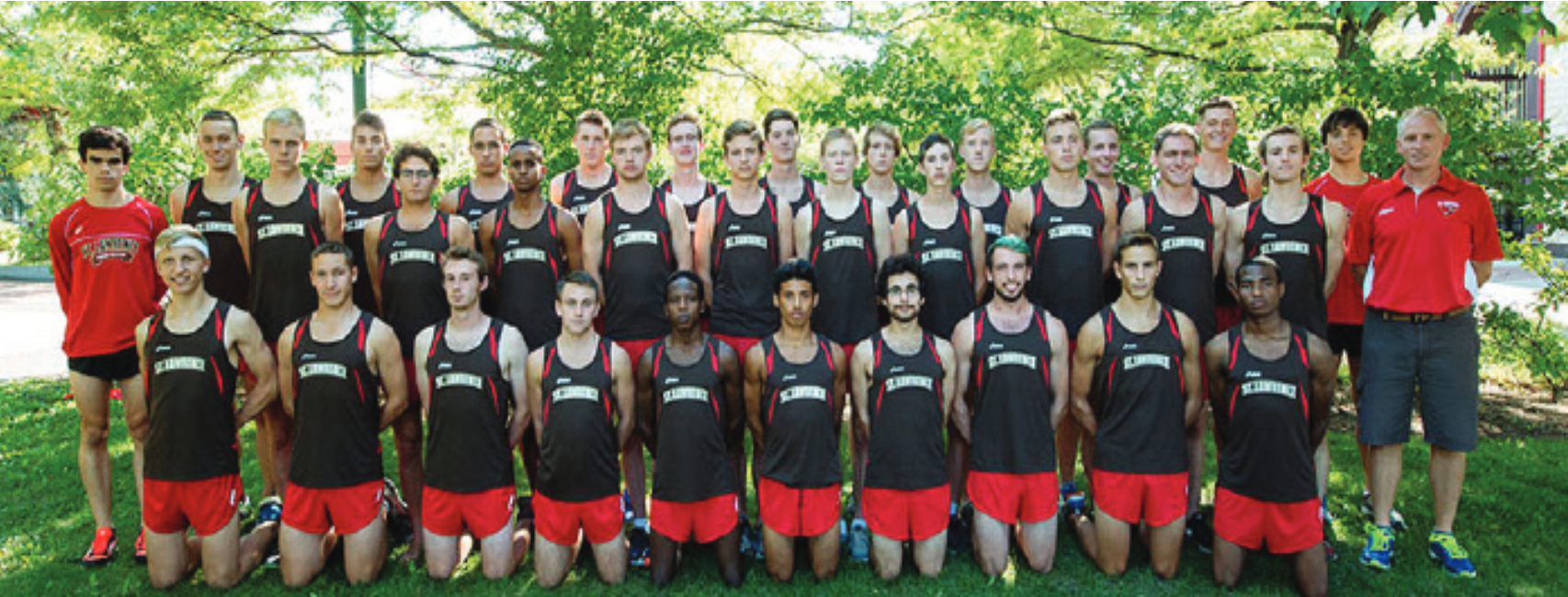Photo courtesy of St. Lawrence University Athletic Communications
St. Lawrence’s Men’s Cross-Country team has made it to 8 straight championships. Yes you read that right. 8 years in a row. In my senior year, I only know the cross-country team as that group of shirtless guys who seem to be constantly motoring around campus, but as I came to find out, there is much more to this team, and the student-athletes that run for it, than meets the eye. Why do they run? Why put do they continually push their bodies to the limits? And why are they so good at it?
It’s 11:10 PM on a Monday night, and sophomore Logan Mancuso is finishing up some homework, but before getting some sleep for his 6:30 AM practice the next morning, he agrees to answer a couple of my questions. As I came to find out, this type of work ethic and drive is not uncommon for this team. Logan has been running cross-country since he was in 8th grade. From the time he started, cross-country has become much more than a sport. For him, it’s a lifestyle that affects everything he does. When asked what a typical training session is like for him he responded with a regiment of, “65-70 miles a week, but we have plenty of runners doing more or less than that. A week of cross country will consist of 2 workout days, 3 easy/moderate days, a race or extra demanding workout, and a long-distance day (anywhere from 12-18 miles).”
“On Tuesdays and Thursdays we have morning practices at 6:30 or 7:00, and then again later in the day. A typical workout day will start at 4:15 with an easy 2 miles warm up. After, we spend a good 15 minutes doing dynamic stretches and striding out. An example workout might be three, 2 mile repeats at a 5:25 (min/mile) pace with a 75 second rest in between. After the workout, we run another 2 miles for a cool down, and then it’s off to the training room for weight lifting.”
Logan also shared that, “Saint Lawrence cross country has never lost Liberty Leagues for as long as it has existed, and we turn out all-Americans every year at Nationals.” Despite the team’s unbelievable success and tireless work ethic, the question remains why do people not know?
Logan shared with me his insight; “Despite this success, the team is very aware of its obscurity; however, this is not a shock to us. Cross-County is simply not a sport that people like to follow or watch. We don’t have regional teams like baseball or football to get people excited about college level running.”
He also added that, “It can be hard for most observers to enjoy watching cross-country runners. Most of the challenge in the sport is not strategy or techniques that observers can critique from the stands. The battle is going on in the muscles and minds of the runners. Additionally, a cross-country race can often wind its way through dense woods, which is not spectator-friendly.” However, not all this lack of recognition is circumstantial; “In the end, not all the blame can be put on the nature of the sport. The cross-county team rarely goes out of its way to advertise itself. Most runners are content with accomplishments that stay within circles that will appreciate them.”
For Logan, this lack of recognition doesn’t bother him or deter him from the grueling workout schedule. He states, “I still run because I love running, I love the team, and I don’t need external validation to feel accomplished.” Also adding, “That being said everyone should still come to the Hoff (Ronald C. Hoffmann invitational) on the 24th and see us run!” And why shouldn’t we?
This type of lifestyle fits Logan, he doesn’t put up with the grueling practices, the consistent pain, or early morning wake ups for the recognition, he does it for the team.
As he puts, “Cross-country means many things. Cross-country is an outlet to some of the best people I know. By suffering everyday with the same group of guys, you develop some of the deepest connections. Stress-wise, running is my way to deal with the stress of school. Running and exercising itself relieves stress, but it’s deeper than t h a t .”
“When I encounter other difficulties outside of running, like a test or project, I don’t stress out as much. I just compare those difficulties to the pain and stress of a race, and then most problems don’t seem quite as bad. Most of all, I’d say cross-country is a lifestyle. Its a commitment to being as healthy as possible, managing your time as efficiently as possible, pushing yourself to the limit in every area in life so that you can get that PR and help the team.”
This type of commitment to excellence is certainly not rare on this campus, but for Logan and the rest of the team it takes on a whole new meaning. One could make the argument that the Cross-Country team is one of, if not the most, successful teams on campus, and yet at the same time it is also arguably one of the most physically demanding sports as well.
Despite this, they do everything they do with little to no recognition. Instead, they do it for each other, and themselves. This commitment to excellence, togetherness, and lifestyle that these runners live for in not only running, but all facets of their lives, truly is another reason that makes this campus such a special place. You can see the team in action at the Ronald C. Hoffmann invitational, Saturday September 24th right here on campus.



